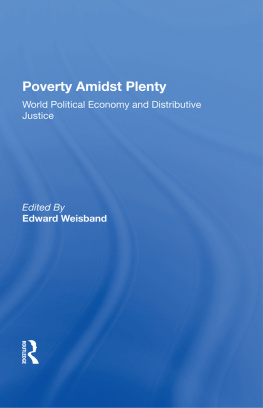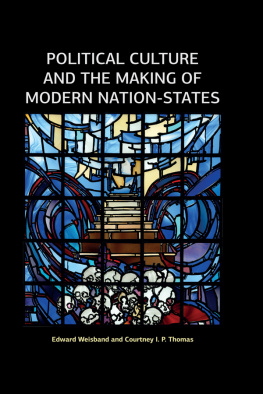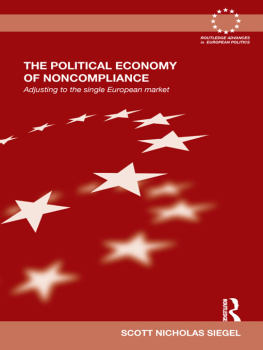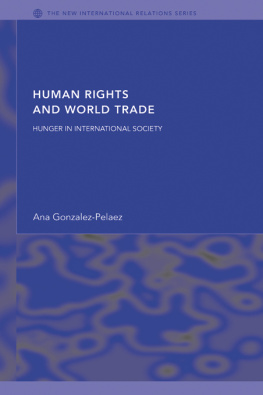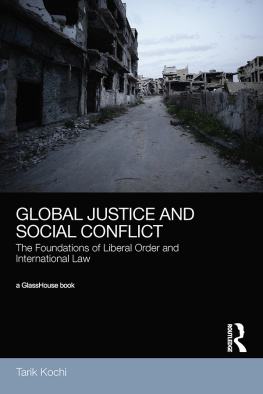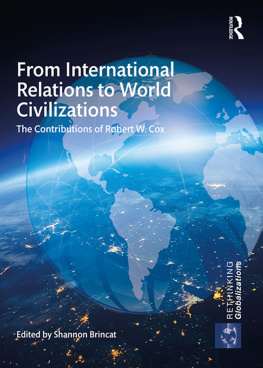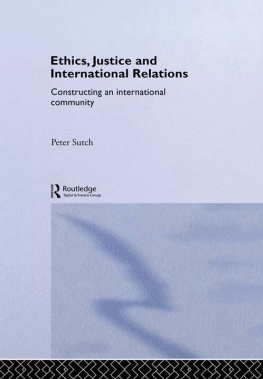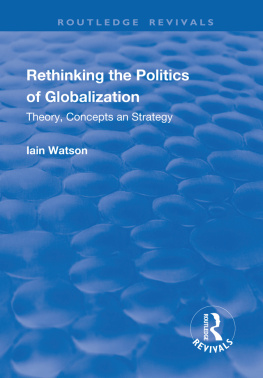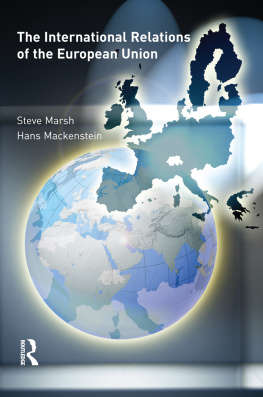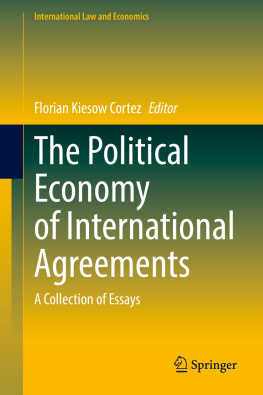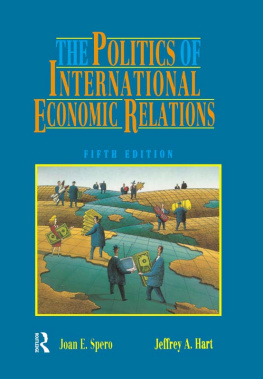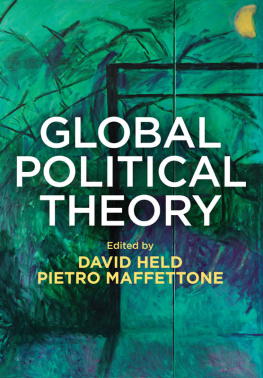Poverty Amidst Plenty
World Political Economy and Distributive Justice
About the Book and Editor
Edward Weisbands pioneering text is destined to transform the current teaching of world political economy at both the introductory and the advanced level. Outlining the moral principles and ethical concepts fundamental to grasping the human significance of poverty, he clearly reveals what is often hinted at but rarely statedthat the political dimensions of poverty and distributive justice constitute the organizing framework of the study of world political economy.
Against a backdrop of readings, Professor Weisbands insightful, inter-pretative essays generate an interdisciplinary discussion, a synthesis of theoretical perspectives and value orientations, providing students with a critical comprehension of the complex workings of the world economy.
The essays link basic approaches to world politics and international relations, international law and organization, international sociology, de-velopment studies, and moral philosophy to give texture to such basic theories as modes of production, dependency, world systems, unequal exchange, the labor theory of value, free-trade liberalism, neomercantilism, Marxism, and neo-Marxism. Alternative value orientations are also explored, including realist and neo-realist, conservative and liberal, egalitarian and cosmopolitan, radical and materialist.
Poverty Amidst Plenty combines theory and analysis with historical and normative perspectives to offer students a relevant, prescriptive, and most of all, human picture of the far-reaching system that governs much of our lives.
Edward Weisband is a Distinguished Teaching Professor in the Department of Political Science at the State University of New York at Binghamton. Winner of numerous commendations, he was selected as the 1987 New York State Professor of the Year and was a gold medal finalist in the Professor of the Year national competition sponsored by the Council for Advancement and Support of Education. He was awarded the 1975 Christopher Society Literary Award for contribution to ethical discourse in American public life for his coauthored publication, Resignation in Protest .
A Note to the Reader: All editors royalties derived from sales of this book will be contributed to charitable causes or nonprofit institutions in support of the quest for social reform and distributive justice.
First published 1989 by Westview Press
Published 2019 by Routledge
52 Vanderbilt Avenue, New York, NY 10017
2 Park Square, Milton Park, Abingdon, Oxon OX14 4RN
Routledge is an imprint of the Taylor & Francis Group, an informa business
Copyright 1989 Taylor & Francis
All rights reserved. No part of this publication may be reproduced or transmitted in any form or by any means, electronic or mechanical, including photocopy, recording, or any information storage and retrieval system, without permission in writing from the publisher.
Notice:
Product or corporate names may be trademarks or registered trademarks, and are used only for identification and explanation without intent to infringe.
Library of Congress Cataloging-in-Publication Data
Poverty amidst plenty.
1. Economic history1945. 2. Distributive
justice. 3. Poor. I. Weisband, Edward, 1939
HC59.P639 1989 330.9 87-12829
ISBN 13: 978-0-367-28402-2 (hbk)
To Joan, the victims of poverty, and the students of P.S. 117
Contents
PART ONE
THE POLITICAL ECONOMY OF DEVELOPMENT
Chapter One
Preliminary Questions
John Arthur and William H. Shaw
Martin Staniland
Paul Harrison
Gerald M. Meier
, Michael Lipton
Chapter Two
Inequality and Income: Measuring the Dimensions of Injustice
, Michael P. Todaro
David M. Smith
, Malcolm Gillis, Dwight H. Perkins, Michael Roemer, and Donald R. Snodgrass
, Keith Griffin and Azizur Rahman Khan
Chapter Three
Class, Capital, and Policy Strategies: Is Justice in Development Possible?
, William W. Murdoch
, Atul Kohli, Michael F. Altfeld, Saideh Lotfian, and Russell Mardon
Richard R. Fagen
, James Petras
, Martin Staniland
, Paul Steidlmeier
PART TWO
THE POLITICAL ECONOMY OF UNEVEN DEVELOPMENT
Chapter Four
Core and Periphery: The History and Theory of Uneven Development
, Peter Gourevitch
, Anthony Brewer
, V. Kublkov and A. A. Cruickshank
, Robert Gilpin
Chapter Five
The New Transnationalism: Toward a Political Economy of Transnational Modes of Production
, Stephen Hymer
, Peter Evans
, Joseph Grunwald and Kenneth Flamm
, Robert W. Cox
PART THREE
THE POLITICAL ECONOMY OF STATES IN THE LIBERAL INTERNATIONAL ECONOMIC ORDER
Chapter Six
States and Distributive Justice: The Search for Grounds
, Terry Nardin
, W. H. Smith
Charles Beitz
Chapter Seven
The Liberal International Economic Order and Distributive Justice
, Miriam Camps, with Catherine Gwin
, Susan Strange
, Stephen D. Krasner
, Richard E. Feinberg
, Robert O. Keohane
Teachers as fortunate as I am to have stood before hundreds of interested and challenging students possess many debts. The State University of New York at Binghamton attracts an outstanding student body, and I have been privileged for many years to have benefited from the extraordinary energies and enthusiasms it has generated. There are so many students for whom I possess such regard. They should be remembered here for their very real contribution to the thoughts presented in this book. But their very number prevents me from acknowledging them in a reasonable amount of space. I merely wish to take the opportunity provided by this publication to express my abiding gratitude to all of them for the exciting, sometimes exhausting, hours we have spent together grappling with the ways of the world in the name of theoretical clarity and moral insight.
In particular, I would like to thank those who have served as my teaching assistants, both graduate and undergraduate. It is my firm and often-repeated conviction that one does not learn until one starts to teach. One of the greatest joys of accomplishment I have known at SUNY-Binghamton stems from my having witnessed the process by which students learn from other studentsand they are learning not just facts but also how to think analytically and conceptually.
The SUNY-Binghamton Department of Political Science is a great teaching department, and I thank my colleagues, one and all, for their collegiality. I am especially indebted to Professor Arthur S. Banks, Chairman, for his outstanding stewardship and for his many, many kindnesses to me; to Professor Richard I. Hofferbert, for his insights regarding theories of development; to Professor James P. Young, for his willingness to share his grasp of the political theory literature and, in particular, his understanding of the theories of distributive justice; to Professor Andrew Milnor, for his illumination of the linkages between research on public policy and the study of values; and to Professor H. L. Nieburg for his great political understanding and for his personal wisdom, which he has so generously shared with me, as well as for his valor in teaching me the intricacies of word processing.

